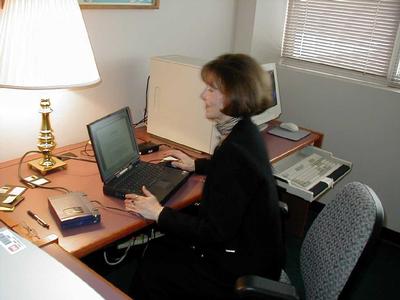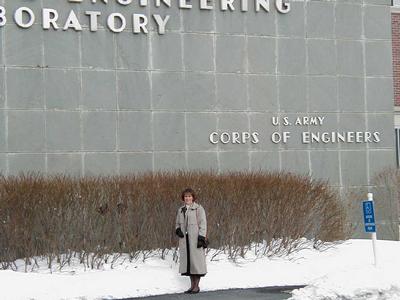3 April, 2001
Conclusion: Acknowledgements to CRREL and Closing Comments
By Sandra Kolb, April 2001
It is with tremendous appreciation that I wish to thank Dr. Barbara Sotirin,
Director of the US Army Cold Regions Research and Engineering Laboratory
(CRREL) of Hanover, New Hampshire; and the scientists, engineers and CRREL
personnel for their extremely professional and personable facilitation of my
work during my visit to their laboratory.
While at CRREL, I represented the National Science Foundation (NSF) funded
Teachers Experiencing Antarctica and the Arctic (TEA) Program in association
with my partnership to Walter (Terry) B. Tucker III and the CRREL research
team during phase III leg 2 of the USCGC Healy's Arctic Sea Ice Trials 2000.
It is because of this partnership, that Terry Tucker had the vision to see
the potential and value of a continued education outreach opportunity for
CRREL by extending our partnership to include this visit.
During my time at CRREL, I not only toured their extensive and impressive
state-of-the-art facilities but also gave an "Invest in People
Presentation." In this seminar, I provided an overview of the Teachers
Experiencing Antarctica and the Arctic (TEA) Program, shared my
parcticipation and responsibilities within this program, and discussed
mentoring and educational outreach activities for scientists. Throughout my
visit, I spoke with scientists and engineers about a variety of ways they
can incorporate education outreach into their individual projects.
My work at CRREL focused on the research projects of their scientists and
engineers. I would like to extend grateful acknowledgements to Jim Clark,
John Gagnon, Antonio Palazzo, Donald Perovich, Mike Reynolds, Devinder
Sodhi, Terry Tucker, John Weatherly and Norbert Yankielun, all from CRREL,
and also to the visiting research team from the Naval Undersea Warfare
Center (NUWC) of Newport, Rhode Island, for their willingness, time and
expertise in extending interviews to me for the profiling of their work for
the purpose of reaching teachers and students. Their positive motivation
and openness for the promotion of education must be commended.
I would be remiss if I did not thank CRREL's media personnel for their
assistance in my presentation and the library resource personnel for their
time and expertise. I could not have succeeded in my work without their
support.
It is my hope that you, too, have observed the tremendous educational
potential and value of the information and resources that the Cold Regions
Research and Engineering Laboratory (CRREL) scientists and engineers so
enthusiastically shared with me for the profiling of their research.

Sandra Kolb at work on the CRREL profiles in a CRREL library guest office. Photo by John Gagnon.

Sandra Kolb at the Cold Regions Research and Engineering Laboratory, Hanover, New Hampshire, in March 2001. Photo by Walter (Terry) B. Tucker III.
Contact the TEA in the field at
.
If you cannot connect through your browser, copy the
TEA's e-mail address in the "To:" line of
your favorite e-mail package.
|
